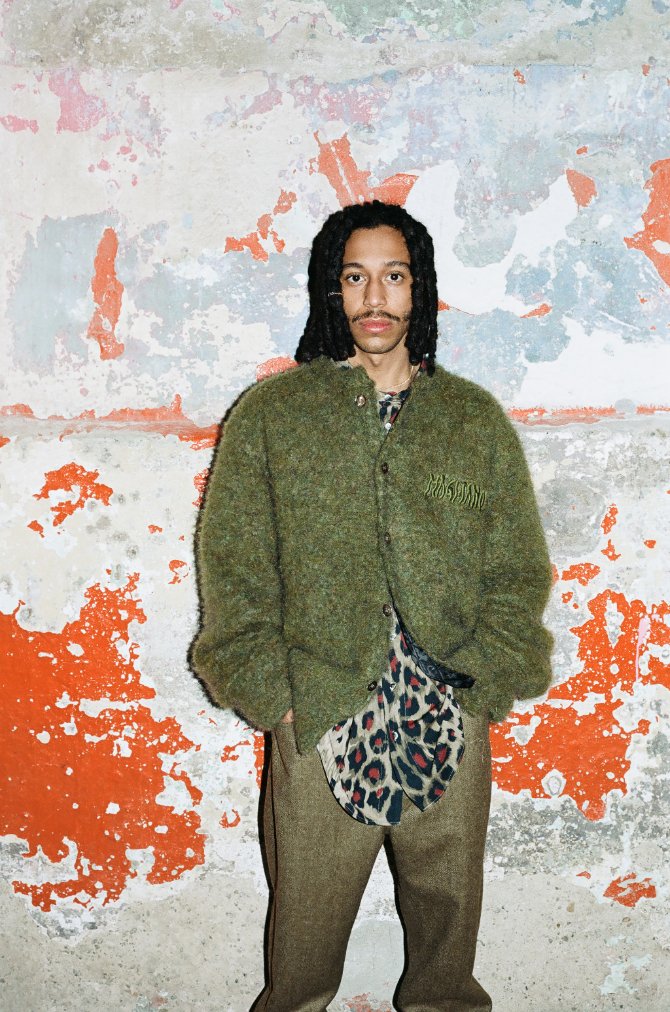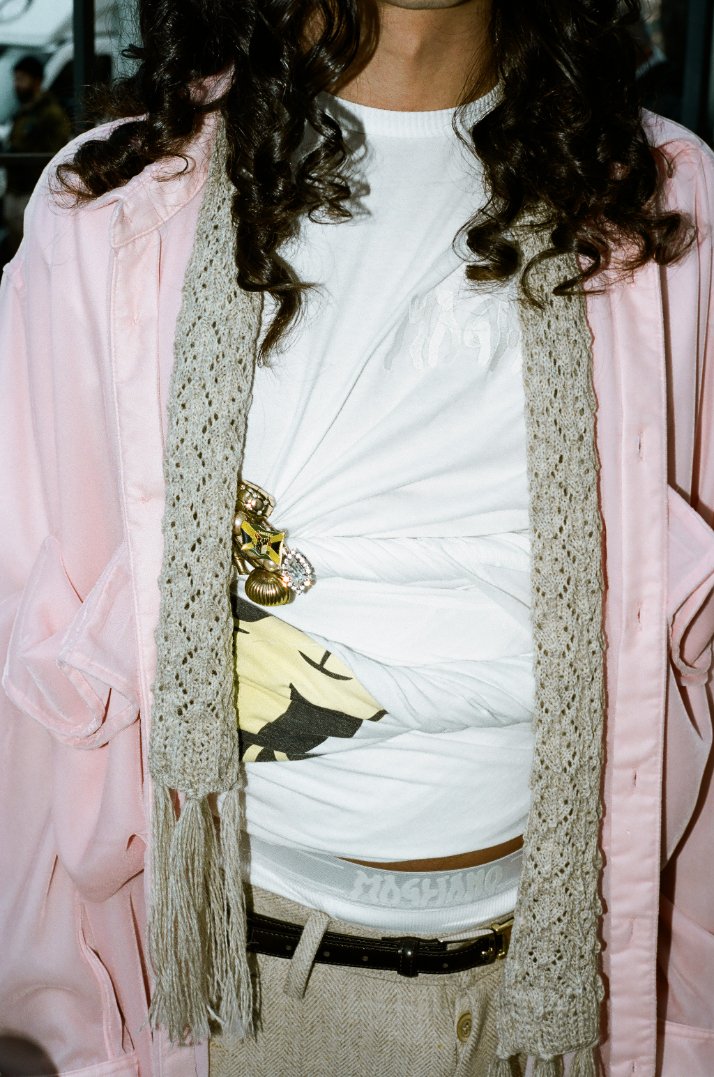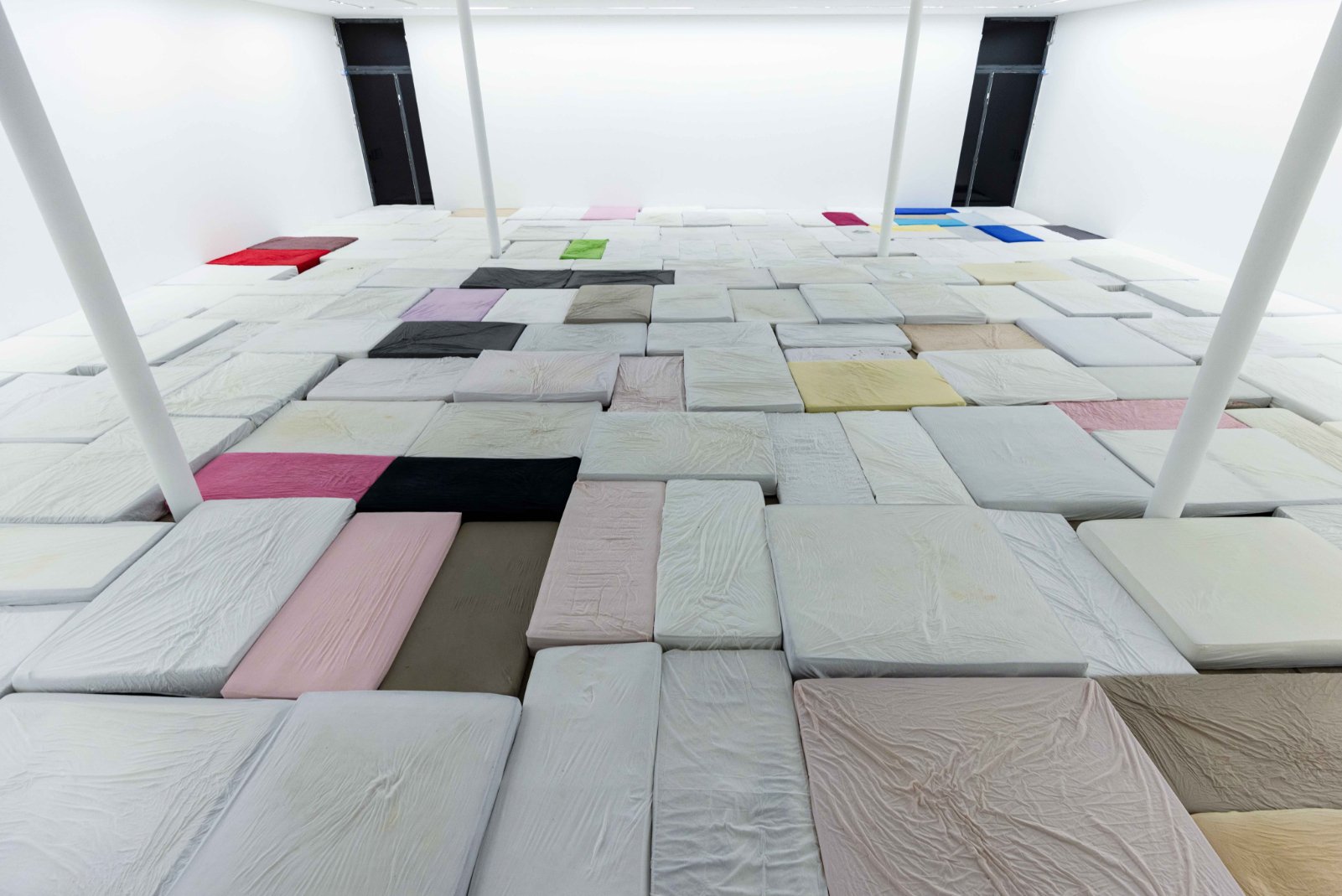Jacket: Lou de Bètoly
photography by Joseph Kadow
photography assistance by Oskar Ott
styling by Hakan Solak
hair & makeup by Lee Hyangsoon
talent Anarchist Sound System
interview by Janna Shaw
In an exclusive interview and photoshoot for Autre, Anarchist Sound System a.k.a. Lou Desamaison-Cognet, musician and founder of Golpe Civil, unveils the complexities of modern society, critiquing a world immersed in electroslavery. Lou a.k.a. Loucifer shares insights into his own psyche as well as inspirations for his collective: from his collection of Nietzsche texts and the occult, to the visceral impact of recent love, loss, and sobriety.
Jacket: Lou de Bètoly
It was a rather mysterious assignment: could I interview a Satanic musician, producer, multi-disciplinarian artist and activist railing against a new world order? “His name is Louicifer, he’s into blood, pain, and beauty.” It was an immediate “Yes” from me. From our first correspondence, I knew Lou was a character from up my own winding back alley. It wasn’t so much the initial introductory greeting, it was the introductory email’s sign-off. Instead of the normal accolades, salutations, or questionable bisous, it was a pointed manifesto of meat: elegantly and adamantly, unabashedly transcribed, coming from not one place above, rather emanating from deep below:
“In a society governed by judgment and the elimination of acceptance, GOLPE CIVIL aims to reveal the most hidden secrets and flaws of this dirty, hypocritical, self-centered system.… We are the underworld: opponents who preach a new world, free of submission; clarity, culture for all, and rebellion. We are not only a record label, we are an experimental project created to fight corruption, false doctrines, and global manipulation.”
Who is Golpe Civil? It’s an Anarchist Sound System. It’s hell’s privately broadcast radio station. It’s a collective group of artists, primarily musicians, railing together to express their insides, no matter how unsettling it may be to the inhabitants of our planetary purgatory. But for the residents who find themselves living in their own version of hell, the rather frightening sounds of Anarchist Sound System may come across as rather benevolent.
Back to Loucifer (or Loucy as they endearingly allow their friends and demon-empathizers to summon them): the music they are creating for A.S.S. is not all electronic manipulation with high intensity BPM. Satan incarnate has side projects, of course. BLASPHEMIA is an experimental noise project based upon an apotheosis mindset, created alongside their girlfriend Darken (more on that dynamic later). NO INJURIES navigates a more delicate soundscape, featuring grand pianos with lots of Amen breaks. Satan has style and a flair for the dramatic, no surprise there.
One late & rainy night in Berlin, we exchange Telegram handles. Fallen angels prefer not to be cellularly traced, but at least they’re open to written communication. I half expect our interview to be conducted through bloody ciphers, of which, with Lou, I was admittedly not necessarily all that opposed...
Full Look: Vintage Levi’s
JANNA SHAW: Good evening Liege Loucy, you’ve been expecting me. I write to you from a very rainy, very dark Berlin. I’m listening to BLASPHEMIA, getting acquainted with you. What are you up to?
LOUCIFER: I imagine Berlin exactly the way you just described it. That’s the Berlin I love so much. The melancholy reflects onto the city during this time of year. There’s a cold, mysterious atmosphere, which I find very inspiring. Every day I am missing Berlin. My family came into Sao Paulo today, so I spent the day with them. They just left.
SHAW: I much prefer Berlin when it’s cold and grey. The Brutalist architecture makes more sense, and so does the general German attitude. Summer is too hot and happy. No one knows what to do with it. How was time with your family? Do they listen to your music?
LOUCIFER: Time with my family was very nice. We went to a restaurant and talked about how things will become December as I will leave Sao Paulo. In February, I am planning to move back to Berlin, so I have a lot of things to organize. My mother hates my music—she simply doesn’t understand it—but my father loved my music. He was always very atypical about his world perception. He pushed me hard in my music experimentation journey. Both of my parents have, actually. They are very nerdy, philosophy lovers. They understand the unconventional as long as it’s harmless. I admire them for unplugging me from a strict, basic vision.
SHAW: What do you think you’ll miss about Sao Paulo? I hear there’s a good underground scene. With your move to Berlin, you’ll be going from one underground to the next. Which do you prefer?
LOUCIFER: The scene in Brazil is really another dimension. It feels like it’s stuck in the ’90s, but in a very good way. There aren’t many clubs here—especially not techno clubs. The scene is all about illegal raves, finding the best abandoned warehouse, placing huge sound systems, and just destroying people’s minds. Berlin is a very structured scene. The underground has been feeding the city for years and years, attracting millions of tourists every day creating evolution for itself. Berlin is an established home for independent artists, businesses, clubs, agencies, etc., while Brazil is a newborn baby in comparison. It still has its innocence, but also a boldness to explore what has not been. It’s a wild country, and Sao Paulo is the center of it.
SHAW: What else is on your mind?
LOUCIFER: Tonight, I’m working on BLASPHEMIA music videos. We are going to release the project at the start of December. It’s a lot of work, but we are super happy with how it’s going. My girlfriend Darken (my BLASPHEMIA counterpart) and I broke up recently, but BLASPHEMIA is our baby, and we will continue to work on this project. Our love is infinite, but the reality is we need to split in different ways to finally meet and be together again. We are not at the same checkpoints, and we want to follow up on some of our own personal goals and projects independently.
SHAW: From the snippets I’ve seen of your project together, the Dark Arts are most certainly at play in BLASPHEMIA...
LOUCIFER: Yes, for the visual inspiration, the source comes from our BDSM background. Darken and I are both tattoo artists and art lovers. She brings the elegance and the sharpness, and I bring the raw, maniacal support to the visuals. We love to think as one, and we managed to fuse into BLASPHEMIA together instantly. We do everything together. It’s the first time in my life I’m editing/cutting videos, playing around with VFX, syncing... I’m in love with it. It’s exactly like Ableton: a bunch of rectangular clips and automations, a lot of time structure, visual guidances and so on. It’s a plug-and-play intuition. I am neurodivergent and when I get excited about something, I have an unstoppable necessity to understand every single detail of anything in the realm of my new chosen interest.
SHAW: Were there certain books, movies, artists, characters that led you to explore the notion of Satanism?
LOUCIFER: I first got into Satanism because of my name and birthday: I was born 09/06/96, my name is Lou Desamaison-Cognet, which translates to “Lou from the Broken House.” I lost my father when I was 21 years old, and my world felt apart. We had a really horrible time. He was diagnosed with bulbar sclerosis, the hardest one. I flew from Berlin to Zurich to help my mother care for him. He was a difficult man, but a warrior that refused to be defeated by anything. This led him to refuse help from the hospital until the last few days of his life. At that point, he had to, because of the euthanasia process. Watching someone you truly admire for four months, dying rapidly... This was his worst nightmare, being a prisoner of his own body. After watching that closely, everything changed for me. I had always been the kid with “no filter” but when this happened, filters quite literally did not exist. Nothing existed for me, except my creative bursts. Growing up, Nietzsche was everywhere in my life. Spinoza was my father’s favorite and Sartre is my mom’s crush. So, I had the privilege of growing up out of the box and experiencing life in my way. My friends always called me the Devil, because of my hyperactivity. But one day, I looked up Satanism on Google and found the [The Eleven Satanic] Rules of the Earth. I read them and identified with everything written in it. I live my life according to them. The interest grew bigger and bigger. I began to reread all my Nietzsche and Machiavelli books, and found an author called Michael W. Ford, which complemented the ‘Self’ section of my brain. My favorite artist of all time is a genius, Satanist, and huge AIDS activist: Diamanda Galás. She was and is ahead of any generation, in terms of music and artistic talent. She has had the most important impact on my actual music vision.
Full Look: No Faith Studios
SHAW: I find that we are currently in a world devoid of all ritual, sacrifice, and purpose. I think Diamanda would agree that we are collectively straying from religion, yet I think a lot of our human experience is lost when we totally ignore our desire and need for some kind of worship.
LOUCIFER: I can’t disagree with you. Today’s world has become a very lost civilization. The electroslavery is getting out of control. People are struggling to believe in their own lives; they’re choking from it. How can we be satisfied if everything created these days is made to keep us exactly where we are? Today’s worship is Instagram, TikTok, and all that bullshit. It’s far easier to create an online avatar than craft every day a new, expanded version of yourself. Everything is accessible by sight. Too many options to choose from. We have created a void that is very hard to fulfill.
SHAW: What led you to create the Golpe Civil collective?
LOUCIFER: I’ve been three times to rehab, back and forth. I had to lose so much to finally be where I am today. Sober and satisfied with my life, I’m giving every particle of my being to myself and my art. I realized that nobody will give a shit about you, let alone love, trust, or respect you if you can’t first do that for yourself. I wrote my Rehab EP in rehab, and created Golpe Civil there too.
SHAW: In your Rehab EP, you penned it as a call to dismantle the notion that drug usage is liberation. What does the reality of sobriety feel like for you?
LOUCIFER: Being sober gives me indescribable access into my own database. It is the most beautiful gift I could have given myself. When enslaved by substance abuse, you tend to settle for the convenient. Even if just subconsciously, you look for every alternative: excuses you can find to justify poor decisions, dismal behaviors, lack of goodwill, and a limitless amount of self-destructive patterns. You eventually accept this, and it is tattooed in your brain as truth. I’ve lived amongst the agonizing torture of that which is habit constantly fighting to take over flesh and bones.
When you explore your consciousness with the bias of a certain molecule creating new neuronal connections, firing up certain parts of your brain and enhancing perception, touch, sensibility, performance, and all of the other aspects and allures of drugs, sooner or later, you will still be faced with yourself. And that self will reclaim every single bit of time that you took from it.
At a certain glimpse of the past, I chose to only see as far as my shadow would go. I leaned into it and left myself in disorder. I am an artist. My aim is to craft my essence, allow my soul to project frustrations, my hate, my passions, my broken heart, my analysis of what I represent and feel onto my sound canvases. And for that I have to live life fully. Art is discipline.
Full Look: GmbH
SHAW: Is it more inspiring for you to dream of & reflect on the past, or do you garner more by following forward motion?
LOUCIFER: I dream constantly. I feel like a clock’s needle bouncing between left and right. I would rather live in a limbo between both illusions of time. I implement nostalgia in my tracks. I myself am often in need of that. But nostalgic fragments are always submerged by the novelty experienced during my creative process. I am a Past romanticizer who finds counterbalance in passion for endless wave-shapes of the future.
SHAW: What is tattooed upon your eyes?
LOUCIFER: Golpe Civil. A civilian coup d’état.
Jacket: No Faith Studios













